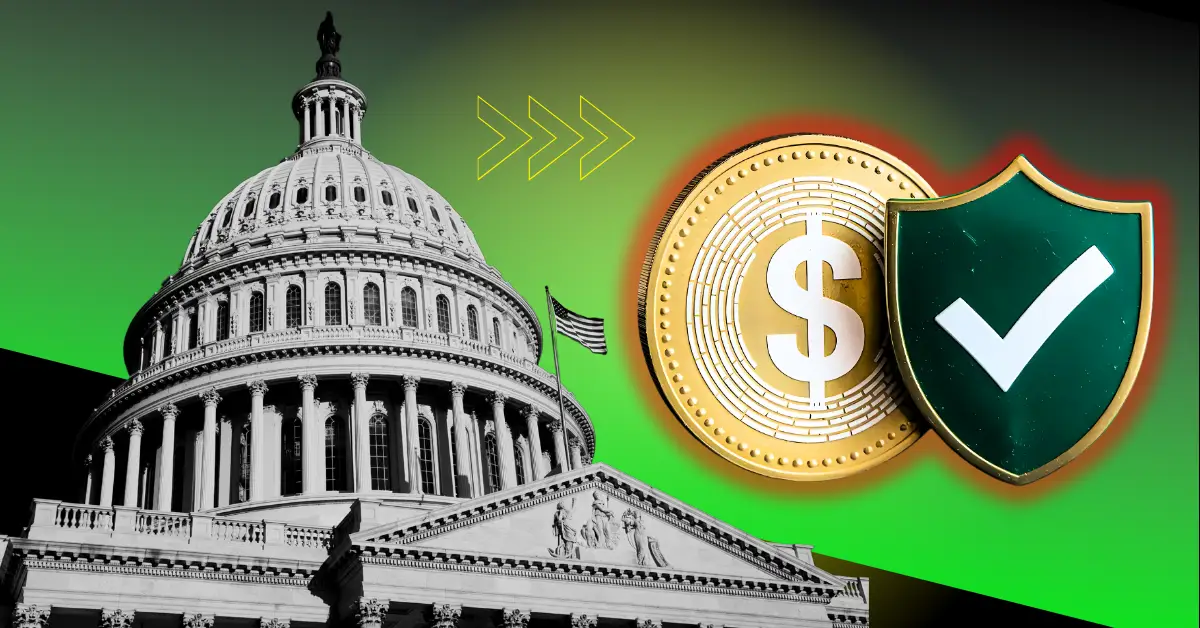
The GENIUS Act, aimed at regulating stablecoins, is slated for a Senate vote before Memorial Day.
This bill would license stablecoin issuers, mandate full reserves and audits, and clarify stablecoins are not securities.
Trump's prior executive order and family-backed stablecoin raise conflict-of-interest concerns amid the GENIUS Act's consideration.
The U.S. Senate is preparing for a key vote on the GENIUS Act, a critical piece of legislation aimed at regulating stablecoins. Senate Majority Leader John Thune has informed Republican lawmakers that the vote is expected before the Memorial Day break on May 26.
Stablecoins, which have become a cornerstone of the crypto world, are currently operating without clear rules, and this bill promises to bring the structure and safety the market desperately needs.
Here’s what you can expect ahead.
The GENIUS Act: What’s Inside?
Introduced by Senator Bill Hagerty in February and passed by the Senate Banking Committee in March, the GENIUS (Guiding and Establishing National Innovation for US Stablecoins) Act seeks to regulate stablecoin issuance in the U.S. The bill mandates that stablecoin issuers must be licensed as “permitted payment stablecoin issuers,” creating a higher level of oversight in a previously unregulated market.
The GENIUS Act is designed to bring order to the rapidly growing stablecoin sector. It works alongside the STABLE Act, introduced in the Republican-controlled House, to set clear guidelines for the issuance of dollar-pegged stablecoins – cryptocurrencies backed by real-world assets that aim to maintain a stable value.
Why Stablecoin Regulation Matters
Stablecoins are gaining popularity as a fast, low-cost way to make digital payments. However, the lack of clear regulations has led to concerns about their safety and reliability. The GENIUS Act tackles these issues by requiring stablecoin issuers to hold full reserves, follow anti-money-laundering (AML) rules, and undergo regular audits.
A crucial element of the GENIUS Act is its decision not to classify stablecoins as securities or commodities, which has been a major point of confusion in the industry. By clarifying this, the bill aims to help stablecoins grow more safely and establish them as potential competitors to traditional payment systems in the future.
Shaping the Future of Stablecoin Regulations
The GENIUS Act is part of a larger effort to regulate stablecoins in the U.S. Earlier this year, President Donald Trump signed an executive order to create a working group focused on exploring stablecoin regulations and possibly setting up a national crypto stockpile. However, while executive orders reflect intent, they don’t have the legal power of a Congressional bill – making the GENIUS Act vote even more crucial.
The timing of Trump’s executive order has raised concerns, especially after World Liberty Financial – a crypto firm linked to Trump’s family – launched its USD1 stablecoin. Critics, mostly from the Democratic side, argue that Trump’s financial ties to the firm could create a conflict of interest as Congress works to pass important crypto legislation.
What’s Next?
With the Senate set to vote on the GENIUS Act, the future of stablecoin regulation in the U.S. is on the line. This legislation could pave the way for a more secure and structured market for stablecoins, setting the stage for their deeper integration into the financial system.
FAQ
A stablecoin is a type of cryptocurrency designed to maintain a stable value by being pegged to real-world assets, like the U.S. dollar.
The GENIUS Act will require stablecoin issuers to hold full reserves, comply with audits, and follow anti-money laundering rules.
Issuers must be licensed, hold full reserves, undergo regular audits, and follow anti-money laundering regulations.








